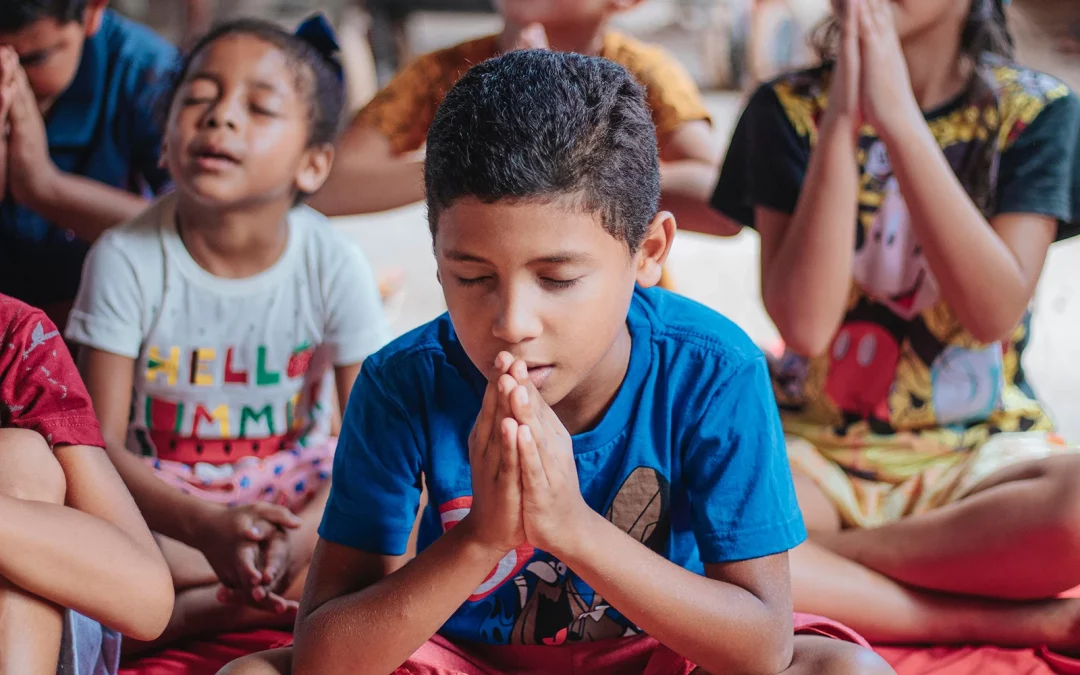
by Adelle M. Banks, RNS | May 5, 2022 | Commentary, Headline News |
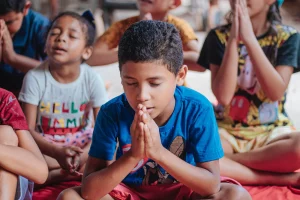
(RNS) — Sunday school and other Christian education programs have suffered during the COVID-19 pandemic, with half of congregations surveyed saying their programs were disrupted.
A March 2022 survey by the Hartford Institute for Religion Research found that larger churches with more than 100 people were more successful in maintaining their educational programming for children and youth, often using in-person or hybrid options. Smaller churches, especially those with 50 or fewer attendees, were least likely to say they continued religious education without disruption.
Scott Thumma, principal investigator of the Exploring the Pandemic Impact on Congregations project, said the findings echoed concerns about general education of schoolchildren, where researchers have seen declines in learning over the last two years.
“My sense is that people knew what good robust Sunday school was or what a successful vacation Bible school was,” said Thumma, drawing in part on open-ended comments in the survey. “And they couldn’t parallel that using Zoom or using livestreaming or using take-home boxes of activities. It just wasn’t the same thing. And so when they evaluated it, it just didn’t measure up to what they previously knew as the standard of a good quality religious education program.”
The findings are the third installment in the five-year project, a collaboration with 13 denominations from the Faith Communities Today cooperative partnership and institute staffers.
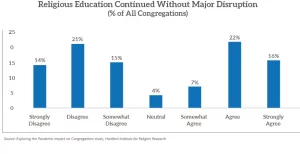
The new report, “Religious Education During the Pandemic: A Tale of Challenge and Creativity,” is based on responses from 615 congregations across 31 denominations.
Comparing data from 2019, churches surveyed in March 2022 reported that the attendance of their religious education programs had decreased an average of 30% among children younger than 13 and 40% among youth, ages 13-17.
“Analysis showed that those who closed their programs had the greatest decline in involvement even after they restarted,” the new report states. “Likewise, churches that moved religious education online lost a higher percentage of participants than churches who modified their efforts with safety protocols but continued meeting in person either outdoors or in small groups.”
The report notes that it’s not surprising the smallest churches experienced the most disruption in their religious education, given the decline in volunteer numbers and additional stresses on clergy during the pandemic.
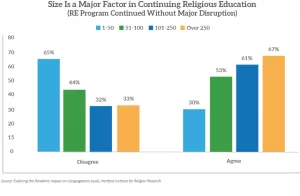
“In the smallest churches (1-50 attendees) pastors were most likely in charge of the religious education programs, while for those between 51 and 100 worshippers, volunteers bore the bulk of leadership responsibilities,” according to the report.
Overall, evangelical churches reported experiencing the least disruption to their educational programs, while mainline churches reported the most, followed by Catholic and Orthodox congregations.
Vacation Bible school, long a staple of congregational outreach to local communities, has also been shaken by COVID-19. More than a third (36%) of churches offered such programs prior to the pandemic. That number decreased to 17% in 2020 and jumped back to 36% in the summer of 2021. Slightly less than a third (31%) reported VBS plans for 2022.
While children’s programming was greatly affected by congregational change during the pandemic, adult religious programs saw the smallest decreases compared with pre-pandemic levels, with a quarter growing since 2019 and an almost equal percentage (23%) remaining even.
But, as with children’s programs, churches with 50 or fewer worshippers saw the greatest loss in adult religious education, while those with more than 250 in worship attendance increased their adult programs by an average of 19%.
Some congregations reported moving Sunday school activities to weeknights or vacation Bible schools from weekday mornings to later hours, with mixed results.
“One said they ‘went from a typical 200+ kids to about 35,’” the report notes, and they “’shortened the number of days and moved VBS to the afternoon.’”
Thumma said innovations including intergenerational and kid-friendly programming helped sustain programs for people of all ages in some congregations. These included revamping of the children’s message time during worship to be more inclusive or older members greeting children who run by during Zoom sessions. Some churches called their all-ages activities “messy church” or “Sunday Funday” as they used interactive educational events.
“It becomes, out of necessity, intergenerational because that allows you to have robust energy and lots of people there,” he said. “But it really is directed at the kids being involved in the life of the congregation in a way that isn’t, like, ‘OK, you go to your class’ and ‘you go to your classes,’ and the classes don’t ever mingle.”
Whether creative steps such as new intergenerational activity will continue remains to be seen, Thumma added.
“I think it should because that’s a valuable strategy,” he said. “One of the things that we’ve seen in lots of our research is the more intergenerational the congregation is, the more it has a diversity of any degree, the more likely they are to be vital and thriving.”
The findings in the new report of the project, which is funded by the Lilly Endowment, have an estimated overall margin of error of plus or minus 4 percentage points.
READ THIS STORY AT RELIGIONNEWS.COM
by Mwikali Munyao | Feb 14, 2022 | Headline News, Prayers & Devotionals |
Job 42: 1-6, 10-17
1 Then Job replied to the Lord:
2 “I know that you can do anything,
and no one can stop you.
3 You asked, ‘Who is this that questions my wisdom with such ignorance?’
It is I—and I was talking about things I knew nothing about,
things far too wonderful for me.
4 You said, ‘Listen and I will speak!
I have some questions for you,
and you must answer them.’
5 I had only heard about you before,
but now I have seen you with my own eyes.
6 I take back everything I said,
and I sit in dust and ashes to show my repentance.”
10 When Job prayed for his friends, the Lord restored his fortunes. In fact, the Lord gave him twice as much as before! 11 Then all his brothers, sisters, and former friends came and feasted with him in his home. And they consoled him and comforted him because of all the trials the Lord had brought against him. And each of them brought him a gift of money and a gold ring.
12 So the Lord blessed Job in the second half of his life even more than in the beginning. For now he had 14,000 sheep, 6,000 camels, 1,000 teams of oxen, and 1,000 female donkeys. 13 He also gave Job seven more sons and three more daughters. 14 He named his first daughter Jemimah, the second Keziah, and the third Keren-happuch. 15 In all the land no women were as lovely as the daughters of Job. And their father put them into his will along with their brothers.
16 Job lived 140 years after that, living to see four generations of his children and grandchildren. 17 Then he died, an old man who had lived a long, full life.
 Nobody likes to deal with pain. I am yet to meet someone who desires to sign up to a conference or a webinar that desires to explore the benefits of pain. It is not a norm in our society nor is it a comfortable topic.
Nobody likes to deal with pain. I am yet to meet someone who desires to sign up to a conference or a webinar that desires to explore the benefits of pain. It is not a norm in our society nor is it a comfortable topic.
Pain can be depressing. Depending on who you talk to, it can have a negative connotation to it. It has the power to connect you to people based on the experiences it brings, but also can isolate you from people because of the triggers it creates.
Job is always described in many sermons by preachers all over the world as the template of suffering. I believe as you read this, your thoughts are already coming up with a picture of what you think I will share regarding his experience. However, today, I want to show you a different aspect of Job that you never considered.
Job, was a man who honored and valued friendship. Joshua 42:10 reveals a hidden gem of divine perspective that we miss as Christians when we deal with pain. Job had gone through the agony of asking and inquiring of the Lord, so why he was dealing with this trial? His pain was public, everyone saw it, he was probably the talk of town and most likely a daily conversation at the dinner table in many homes.
Imagine how he must have felt, when his closest friends began inquiring of him if he was sure he had not done anything to bring this pain and harsh trial into his life. I believe that must have been painful. Think of the people who are close to you, who see your everyday life and understand your values, questioning you because your situation is so far-fetched and hopeless, that the only rational explanation that makes sense is, you are to blame for your pain.
Have you been judged? Have you dealt with a life situation that doesn’t make sense to those around you? Have the questions from those close to you, become like a sting to your soul because of the audacity they show, to inquire as to why you are where you are?
How did Job move from a place of such agony and frustration to a place of a divine turnaround? His restoration was was provoked by a decision he made.
- He willingly forgave his friends, and prayed for them. Job could have easily let his friends go and become bitter. I believe he had already experienced bitterness and there was nothing good that came out of it. He chose to seek the wellbeing of those he cared for by praying for them
- He took his eyes off of his life, and did what he knew was best, pray. Job always prayed for those he loved. Job 1:5 shares how he always rose up early to pray and consecrate his children in case they had sinned against God. The pain of the trial Job was going through, made him forget what he was great at, praying for others. When he turned back to it, and prayed for his friends, his heart was softened to view his life differently. If not checked, pain can isolate and bring such anger to your life, that repels those who care about you
When he did this, the Lord restored his fortunes, his brothers and sisters showed him sympathy and comforted him while giving him money and gifts.
This season you are dealing with, is not here to consume you. God can restore and redeem you, in a way that makes you heal from the pain you went through, and desire to live a long fruitful life. He is a prayer away. Be encouraged.
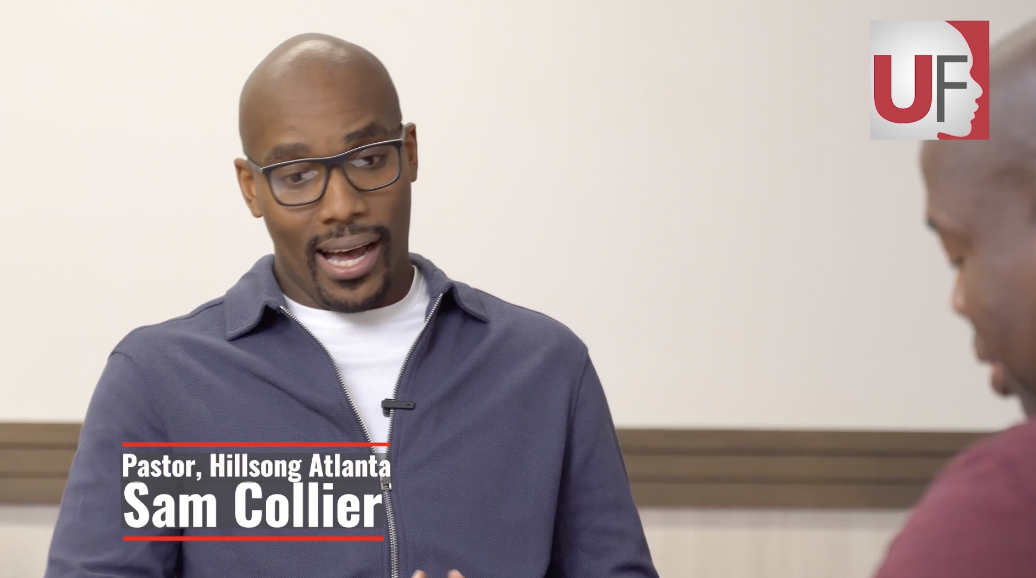
by Maina Mwaura, Urban Faith Contributing Writer | Jul 7, 2021 | Headline News |
Sam Collier just started his tenure as the new lead pastor of Hillsong Church’s Atlanta location and it has come with tremendous interest. Pastor Sam is pursuing many firsts; he is the first African American pastor at a Hillsong Church, he is the first black pastor in the Hillsong global network, and this is his first time as a lead pastor after spending years serving at 20,000+ member North Point Community Church with Pastor Andy Stanley. Hillsong Church is one of the most popular church movements in the world with locations on every continent except Antarctica, music that has influenced a generation, conferences attended by hundreds of thousands, and ministries that reach around the globe. Yet in the midst of racial unrest, a global pandemic, and economic uncertainty, Hillsong church has not had an African American in pastoral leadership…until now. UrbanFaith contributor Maina Mwaura sat down to interview Pastor Sam Collier about his decision, the challenges, and his hopes in his role as the first black pastor in one of the largest most recognized church movements in the world. Full interview is above.
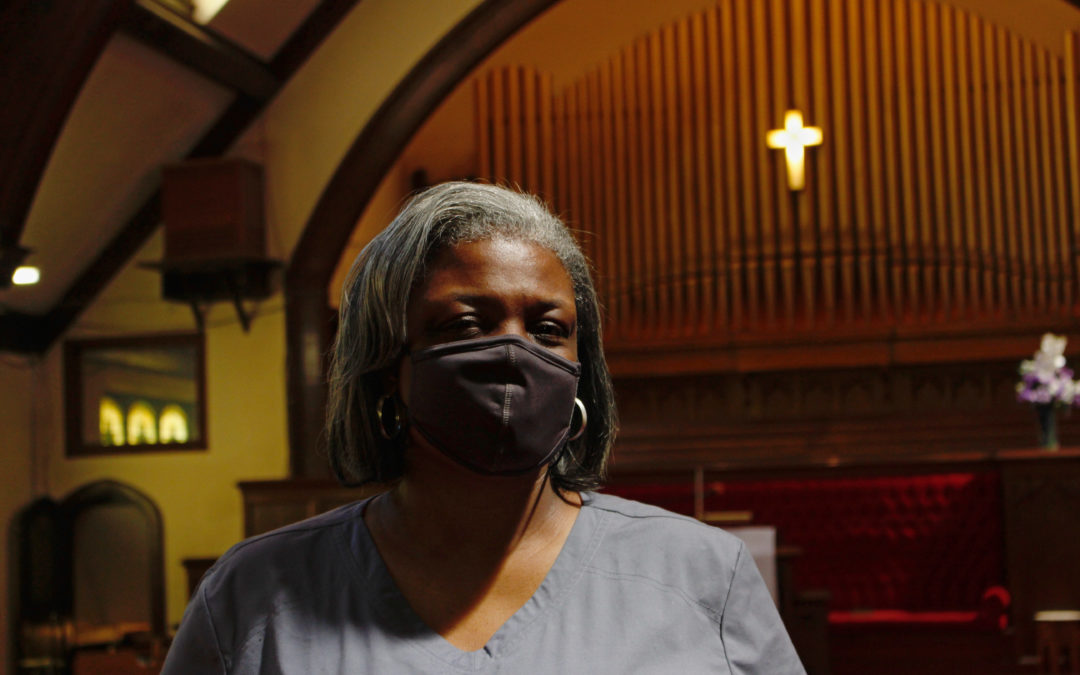
by Carrie Antlfinger, AP | Jun 25, 2021 | Commentary, Headline News |
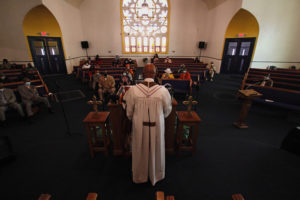
In this May 9, 2021, photo, Rev. Joseph Jackson Jr. talks to his congregation at Friendship Missionary Baptist Church in Milwaukee during a service. He is president of the board of directors for Milwaukee Inner City Congregations Allied for Hope, which along with Pastors United, Souls to the Polls and the local health clinic Health Connections, is working to get vaccination clinics into churches to help vaccinate the Black community. He’s also been urging his congregation during Sunday services to get vaccinated. (AP Photo/Carrie Antlfinger)
MILWAUKEE (AP) — Every Sunday at Friendship Missionary Baptist Church, the Rev. Joseph Jackson Jr. praises the Lord before his congregation. But since last fall he’s been praising something else his Black community needs: the COVID-19 vaccine.
“We want to continue to encourage our people to get out, get your shots. I got both of mine,” Jackson said to applause at the church in Milwaukee on a recent Sunday.
Members of Black communities across the U.S. have disproportionately fallen sick or died from the virus, so some church leaders are using their influence and trusted reputations to fight back by preaching from the pulpit, phoning people to encourage vaccinations, and hosting testing clinics and vaccination events in church buildings.
Some want to extend their efforts beyond the fight against COVID-19 and give their flocks a place to seek health care for other ailments at a place they trust — the church.
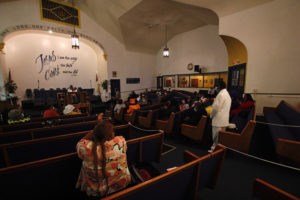
In this May 9, 2021, photo, Rev. Joseph Jackson Jr. talks to his congregation at Friendship Missionary Baptist Church in Milwaukee during a service. He is president of the board of directors for Milwaukee Inner City Congregations Allied for Hope, which along with Pastors United, Souls to the Polls and the local health clinic Health Connections is working to get vaccination clinics into churches to help vaccinate the Black community. He’s also been urging his congregation during Sunday services to get vaccinated. (AP Photo/Carrie Antlfinger)
“We can’t go back to normal because we died in our normal,” Debra Fraser-Howze, the founder of Choose Healthy Life, told The Associated Press. “We have health disparities that were so serious that one pandemic virtually wiped us out more than anybody else. We can’t allow for that to happen again.”
Choose Healthy Life, a national initiative involving Black clergy, United Way of New York City and others, has been awarded a $9.9 million U.S. Department of Health and Human Services grant to expand vaccinations and and make permanent the “health navigators” who are already doing coronavirus testing and vaccinations in churches.
The navigators will eventually bring in experts for vaccinations, such as the flu, and to screen for ailments that are common in Black communities, including heart disease, hypertension, diabetes, AIDS and asthma. The effort aims to reduce discomfort within Black communities about seeking health care, either due to concerns about racism or a historical distrust of science and government.
The initiative has so far been responsible for over 30,000 vaccinations in the first three months in 50 churches in New York; Newark, New Jersey; Detroit; Washington, D.C.; and Atlanta.
The federal funding will expand the group’s effort to 100 churches, including in rural areas, in 13 states and the District of Columbia, and will help establish an infrastructure for the health navigators to start screenings. Quest Diagnostics and its foundation has already provided funding and testing help.
Choose Healthy Life expects to be involved for at least five years, after which organizers hope control and funding will be handled locally, possibly by health departments or in alignment with federally supported health centers, Fraser-Howze said.
The initiative is also planning to host seminars in churches on common health issues. Some churches already have health clinics and they hope that encourages other churches to follow suit, said Fraser-Howze, who led the National Black Leadership Commission on AIDS for 21 years.
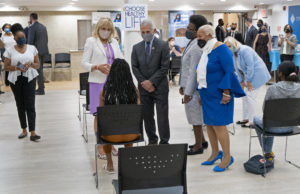
FILE – In this file photo taken June 6, 2021, first lady Jill Biden, center left, Dr. Anthony Fauci, director of the National Institute of Allergy and Infectious Diseases, Choose Healthy Life public health navigator Linda Thompson and Choose Healthy Life Founder Debra Fraser-Howze, far right, speak to a person as they visit a vaccine clinic at the Abyssinian Baptist Church in the Harlem neighborhood of New York. The church is part of Choose Healthy Life, a national initiative involving Black clergy, United Way of New York City and others, that has just been awarded a $9.9 million U.S. Department of Health and Human Services grant to expand vaccinations and provide screening and other health services in churches. (AP Photo/Craig Ruttle, File)
“The Black church is going to have to be that link between faith and science,” she said.
In Milwaukee, nearly 43% of all coronavirus-related deaths have been in the Black community, according to the Milwaukee Health Department. Census data indicates Blacks make up about 39% of the city’s population. An initiative involving Pastors United, Milwaukee Inner City Congregations Allied for Hope and Souls to the Polls has provided vaccinations in at least 80 churches there already.
Milwaukee is one of the most segregated cities in the country, according to the studies by the Brookings Institution. Ericka Sinclair, CEO of Health Connections, Inc., which administers vaccinations, says that’s why putting vaccination centers in churches and other trusted locations is so important.
“Access to services is not the same for everyone. It’s just not. And it is just another reason why when we talk about health equity, we have … to do a course correction,” she said.
She’s also working to get more community health workers funded through insurance companies, including Medicaid.
The church vaccination effort involved Milwaukee Inner City Congregations Allied for Hope, which is faith organization working on social issues. Executive Director and Lead Organizer Lisa Jones says the effect of COVID-19 on the Black community has reinforced the need to address race-related disparities in health care. The group has hired another organizer to address disparities in hospital services in the inner city and housing, and lead contamination.
At a recent vaccination clinic in Milwaukee at St. Matthew, a Christian Methodist Episcopal church, Melanie Paige overcame her fears to get vaccinated. Paige, who has lupus and rheumatoid arthritis, said the church clinic helped motivate her, along with encouragement from her son.
“I was more comfortable because I belong to the church and I know I’ve been here all my life. So that made it easier.”
___
Associated Press religion coverage receives support from the Lilly Endowment through The Conversation U.S. The AP is solely responsible for this content.
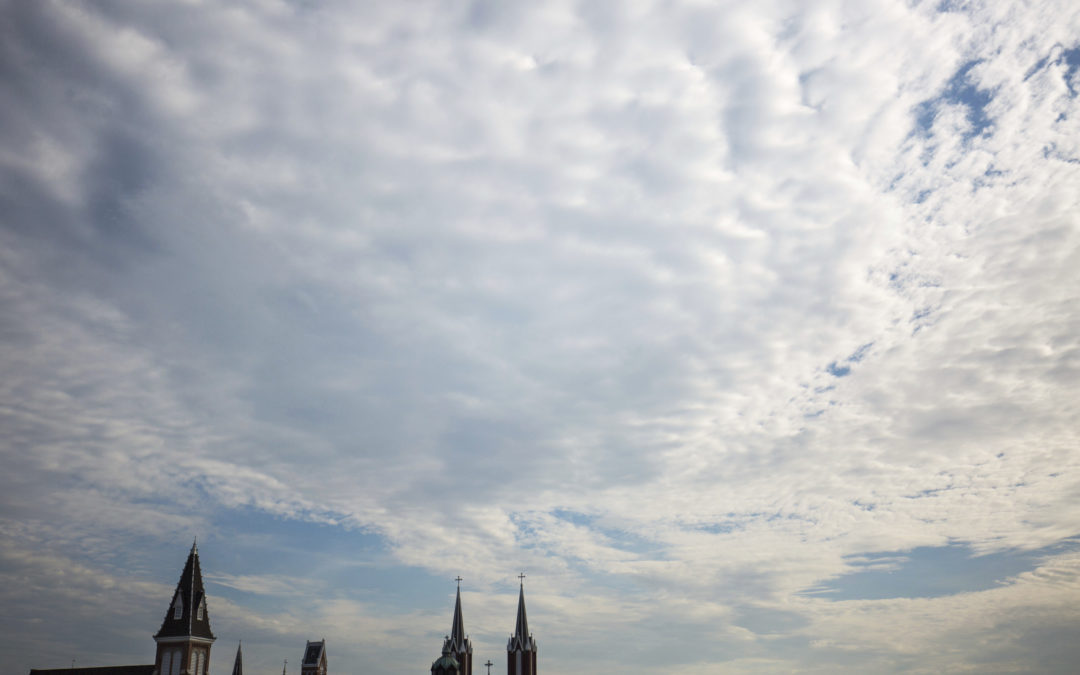
by Luis Andres Henao | May 25, 2021 | Headline News |

This Sunday, July 10, 2016 photo shows the First Baptist Church, left, the First Baptist Church of Christ, center, and Saint Joseph’s Catholic Church in Macon, Ga. About 170 years ago, the two Baptist churches were one congregation, albeit a church of masters and slaves. Then the fight over abolition and slavery started tearing badly at religious groups and moving the country toward Civil War. The Macon church, like many others at the time, decided it was time to separate by race. (AP Photo/Branden Camp)
The faith community should guide the way on reparations for America’s history of slavery and racial discrimination and help the nation’s process of reconciliation and healing, religious leaders said during a panel held to discuss the issue.
U.S. religious groups have seen widespread interest in reparations, especially among Protestant churches that were active in the era of slavery. Many are starting or now considering how to make amends through financial investments and long-term programs benefiting Black Americans.
“The faith community not only can lead but should lead, and is in a unique position to lead,” the Rev. Iva E. Carruthers, general secretary of the Samuel DeWitt Proctor Conference, said during the Wednesday panel organized by The Associated Press, The Religion News Service and The Conversation.
The Episcopal Diocese of Maryland voted last year to create a $1 million reparations fund, likely to finance programs supporting Black students, nursing home residents, small-business owners and others. The vote followed years of research into how the diocese had benefited from racial inequality and slavery.
“If not the faith community, who? And if not now, when?” said the Right Rev. Eugene Sutton, the first Black cleric to hold the post of bishop of the diocese.
“Perhaps one of the reasons why so many in our society are saying, ‘Well, I can be spiritual, but I don’t have to belong to any religious organization,’ is because religious faith communities have failed to live up to their scriptures and to our words,” Sutton said. “We need to put our money where our mouth is. And reparations is one way to do that.”
Panelists were asked what they tell those who oppose reparations on the grounds that they’re not guilty of slaveholding or racism and shouldn’t be asked to pay for those crimes. Sutton said it’s not about guilt but a responsibility to repair the damage caused.
“Reparations is not a transfer of money from white people to Black people,” Sutton said. “It’s rather what this generation will do to correct the wrongs that previous generations have started.”
University of South Carolina history professor Nicole Maskiell, who has worked with congregations involved in reparations initiatives, praised faith communities for being first and leading by example.
“That takes courage,” she said. “It takes commitment, and it also takes a willingness to tell the truth.”
The Minnesota Council of Churches has cited a host of injustices — from mid-19th century atrocities against Native Americans to police killings of Black people — in launching a first-of-its kind “truth and reparations” initiative.
The initiative engages a diverse collection of 25 Christian member denominations, including some that are predominantly Black, and will model some of its efforts on South Africa’s post-apartheid Truth and Reconciliation Commission. It is based in Minneapolis, where the police killing of George Floyd last May sparked global protests over racial injustice.
“When I was growing up, white supremacy was a problem of the South. … Within the last five years, just here in Minneapolis, we’ve had the killing of Jamar Clark, Philando Castile, George Floyd, Daunte Wright,” said the Rev. Jim Bear Jacobs, the council’s director of racial justice. “All of this within 7 miles of each other, each one of those young men all at the hands of police, all unwarranted killings.”
“How did we, as a city of Minneapolis, how did we get to this point? And the only answer one can arrive at is white supremacy.”
Jacobs, who belongs to a Wisconsin-based Mohican tribe but was born in Minnesota, said the initiative seeks to address social justice concerns of African Americans and Native Americans in a unified way: “We are so much stronger together than we are doing our justice work in silos.”
Panelists said they’re hopeful that the latest attempts to address reparations will turn into meaningful action because the country is in the midst of a historic reckoning on racism, because young people are engaged and seeking justice and because faith communities have come together to demonstrate.
“Every night over the roar of the cries for justice, you could hear the indigenous drumbeat. … We’re there,” Jacobs said. “I have linked arm-in-arm with rabbis and imams and bishops and pastors.”
Rep. Sheila Jackson Lee, D-Texas, who has sponsored a bill that would create a commission to study slavery and discrimination in the United States from 1619 to the present, said she hopes it will be passed by the House in late June.
The commission would also recommend ways to educate Americans about its findings and appropriate remedies, including how the government would offer a formal apology and what form of compensation should be awarded.
Support from the faith community, she said, is crucial: “It can help people, Americans, grapple with, understand and feel comfortable with doing the right thing.”
“We’ve come this far by faith, our beliefs, whether or not we’re reading from the Quran or the Torah, we’re reading from the Bible or any other faith book somewhere in there about love and charity and somewhere in there about restoration. I know there’s something in there about redemption,” Jackson Lee said. “That’s what America has to do.”
__
Associated Press writers David Crary and Kevin Freking contributed to this report.
___
Associated Press religion coverage receives support from the Lilly Endowment through The Conversation U.S. The AP is solely responsible for this content.





 Nobody likes to deal with pain. I am yet to meet someone who desires to sign up to a conference or a webinar that desires to explore the benefits of pain. It is not a norm in our society nor is it a comfortable topic.
Nobody likes to deal with pain. I am yet to meet someone who desires to sign up to a conference or a webinar that desires to explore the benefits of pain. It is not a norm in our society nor is it a comfortable topic.





